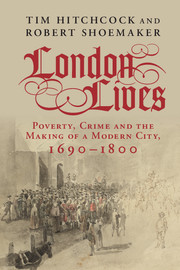Book contents
- Frontmatter
- Dedication
- Contents
- List of figures
- Preface
- Acknowledgements
- List of abbreviations
- 1 Introduction
- 2 Beggarman, thief: 1690–1713
- 3 Protest and resistance: 1713–1731
- 4 Vestries, justices and their opponents: 1731–1748
- 5 Reformers and their discontents: 1748–1763
- 6 Finding a voice: 1763–1776
- 7 The state in chaos: 1776–1789
- 8 Epilogue: The 1790s
- Bibliography
- Index
- References
Bibliography
Published online by Cambridge University Press: 05 December 2015
- Frontmatter
- Dedication
- Contents
- List of figures
- Preface
- Acknowledgements
- List of abbreviations
- 1 Introduction
- 2 Beggarman, thief: 1690–1713
- 3 Protest and resistance: 1713–1731
- 4 Vestries, justices and their opponents: 1731–1748
- 5 Reformers and their discontents: 1748–1763
- 6 Finding a voice: 1763–1776
- 7 The state in chaos: 1776–1789
- 8 Epilogue: The 1790s
- Bibliography
- Index
- References
- Type
- Chapter
- Information
- London LivesPoverty, Crime and the Making of a Modern City, 1690–1800, pp. 414 - 443Publisher: Cambridge University PressPrint publication year: 2015



